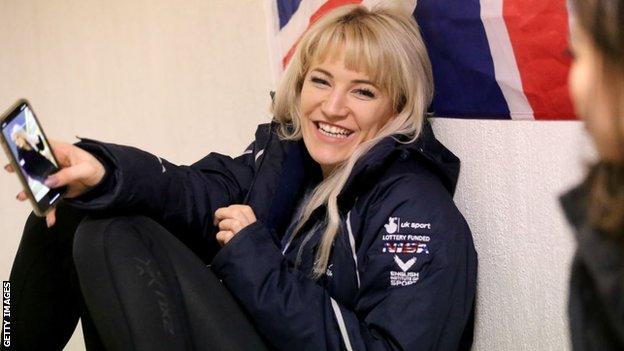Elise Christie: British short track speed skater finds positives in adversity
- Published

Christie has spoken previously about her struggles with depression and self-harm
"I'm in a really great place and I want to go and race."
The coronavirus pandemic has affected everybody in different ways. For former short track speed skating world champion Elise Christie, it has been a chance to "reset" from a "negative spiral".
There remains one frustration - a lack of competitive action - but a positive mindset has helped the 30-year-old through this most testing of years.
National lockdown? It helped her anxiety.
Having to spend lockdown with an ex-boyfriend? It was good to have the company.
Ice rinks closed? She got even fitter at home.
All competition this year cancelled? It could give her an advantage over her rivals.
That has not always been the kind of outlook Britain's best short track speed skater has had - or been able to have.
Her struggles with mental health and self-harm have been well-documented since the 2018 Winter Olympics, where for the second successive Games her quest for an elusive medal ended in tears.
These days, though, it would appear Christie is taking whatever the world has to throw at her in her stride.
"Lockdown gave me some time to really reset because things hadn't gone very well since the Olympics," the Scot told BBC Sport.
"If anything, it's good for my anxiety because sometimes it's better for me not to be around people as much."
Even a nightmare scenario for many - having to spend lockdown with a former partner - was welcome relief.
"That made the news in a strange way," she laughed. "At least I had someone there, and we do get along, so I was kind of thankful I didn't have to spend the whole thing alone.
"The only thing that frustrated me was not being able to skate and get access to gyms.
"But mentally it was really good for me. I'd had such a horrible season last year and I'd ended up depressed again.
"I'd got into such a negative spiral and I just could have done with a reset - which I wouldn't have taken unless it was enforced."
From April 2019: Christie opens up about anxiety and depression
Mid-lockdown, former GB short track skater Richard Shoebridge took over as Christie's coach, and she credits his "patient and positive" approach with helping her focus on regaining her fitness.
With ice rinks closed from March until September, she had to set up a home gym and get inline skates and even her mum's old watt bike in order to achieve that from home.
She says her fitness now is "higher than normal" and even better than in the period going into the 2018 Games.
"I'm much more robust than I've ever been probably," she says.
"It's just the skating skill that's gone down a bit and that's got to come back up."
With all short track World Cups for the rest of the year cancelled, Christie must rectify that in her training group in Nottingham.
"It's frustrating because last year I got to the point physically and mentally where I didn't really want to race and now I'm in a really great place and I want to go and race - and I can't," she said.
"We want to go out and do the Worlds especially. I'm really hoping they can run the Europeans as it costs less and is easier to get everyone together."
Christie now faces the prospect of only completing one full season between the 2018 and 2022 Winter Games.
"In 2019 I had some time out, last year I had major surgery when I had my appendix out, and this season there's been the pandemic," she said.
"I thought it might be full-on and maybe I'd be sick of it by the time I got to the Games.
"I guess the only positive is I've not been over-pushed; my body's fresh and in a good place to train.
"The opposition haven't seen me so they don't know how I'm skating and what I'm working on.
"Hopefully I'll be a bit of a surprise to everyone. I'm excited."
But could this positive mindset lead to positive results for Christie at Beijing 2022?
"I'll feel like I'm going to win a medal because I always have done," she said.
"And I should have medals by now and I believe I can - I've not lost that ability.
"But it's not just about that now.
"It's about actually going out there and enjoying an Olympics. And promoting people not to give up."
If you've been affected by self-harm or emotional distress, help and support is available via the BBC Action Line.